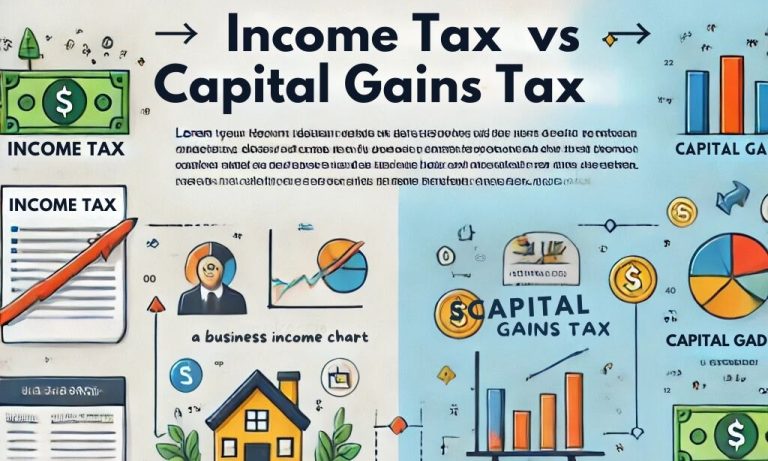The difference between income tax and capital gains tax is a fundamental concept in personal and corporate finance. Both taxes constitute a substantial percentage of revenues collected by governments but are levied on different kinds of income. Income tax is charged based on the total income of an individual or entity, while capital gains tax is specifically charged on profits gained from the sale of investments or other assets. The knowledge of both taxes is crucial for proper financial planning and compliance.
What is Income Tax?
Income tax is a tax levied on an individual’s or entity’s earnings during a financial year. It is a direct tax imposed by the government and is calculated based on predefined income slabs and tax rates. Earnings subject to income tax include salaries, business profits, rental income, and interest on savings.
Example: If an individual earns ₹8,00,000 annually, they may fall under a 20% tax slab (based on prevailing tax rates), paying ₹1,60,000 in income tax after considering exemptions and deductions.
Key Features of Income Tax
Income tax is mandatory on earnings and ensures the government earns revenues. It shows an individual’s or any entity’s financial activity. It covers all sorts of incomes and follows the structured assessment and filing system.
- Broad Scope: Covers all types of income, including wages, profits, and rental earnings.
- Progressive Taxation: Higher-income earners pay a larger percentage in tax due to progressive tax slabs.
- Filing Requirement: Individuals and businesses must file annual tax returns to declare their income and pay taxes.
What is Capital Gains Tax?
Capital gains tax is a tax imposed on the profit realized from selling a capital asset, such as stocks, real estate, or bonds. The tax is only applicable when the asset is sold at a profit, not during its ownership. Capital gains are categorized as long-term or short-term, depending on the holding period of the asset.
Example: If an individual sells a property for ₹50,00,000, which was purchased for ₹30,00,000, the capital gain is ₹20,00,000. Depending on the holding period, this amount will be taxed as STCG or LTCG.
Key Features of Capital Gains Tax
Capital gains tax focuses on profits earned from selling capital assets, with tax rates varying based on the holding period and applicable exemptions.
- Asset-Specific: Applies only to gains from the sale of capital assets.
- Holding Period Matters: Different tax rates apply to long-term and short-term gains.
- Exemptions Available: Certain investments, like residential property or tax-saving bonds, may be exempt from capital gains tax.
Types of Capital Gains
Capital gains fall under two categories regarding the holding period of assets essential determinants of applicable tax rates and resultant gains. These categories help in the proper taxation of gain based on asset retention periods.
- Short-Term Capital Gains (STCG): Gains from assets held for a short duration, usually less than 12 months for stocks and mutual funds. Taxed at a higher rate, often the applicable income tax slab rate.
- Long-Term Capital Gains (LTCG): Gains from assets held for a longer duration, typically more than 12 or 36 months depending on the asset. Taxed at a lower rate, often around 10-20%, with indexation benefits.
Difference Between Income Tax & Capital Gains Tax
The income tax vs capital gains tax distinction lies in their application, calculation, and scope. Here are five key differences:
Definition
- Income Tax: Income tax is a tax imposed on the total income earned by an individual or entity in a financial year. This tax covers all sources of income, reflecting an individual’s or organization’s overall earnings during the specified period.
- Capital Gain Tax: Capital gains tax, in contrast, applies specifically to the profit earned from the sale of capital assets. These assets include property, shares, Debentures, and other investments. The tax is levied only on the gains realized from these transactions.
Scope
- Income Tax: Income tax has a broad scope, applying to all categories of income. It encompasses earnings from salaries, business profits, rental income, interest, and other sources. Every eligible earner must comply with income tax regulations, regardless of the type or source of income.
- Capital Gain Tax: Capital gains tax, however, has a narrower scope. It only applies to profits derived from the sale or transfer of capital assets. If no asset transaction occurs, no capital gains tax is applicable.
Types of Income Covered
- Income Tax: Income tax covers various types of income, including salaries, profits from businesses, rental income, and interest from savings or investments. It reflects a person’s or entity’s comprehensive earnings during a financial year.
- Capital Gain Tax: Capital gains tax focuses solely on income from the sale of capital assets. These include property, stocks, bonds, and mutual funds. The tax is levied only when a transaction results in a gain.
Tax Rates
- Income Tax: Income tax rates follow progressive slabs based on income levels. Higher-income earners pay a greater percentage of their earnings in tax, ensuring a proportionate burden based on financial capacity.
- Capital Gain Tax: Capital gains tax rates depend on the holding period of the asset. Short-term capital gains (STCG) are taxed at higher rates, often aligned with regular income tax slabs, while long-term capital gains (LTCG) typically have lower, fixed rates.
Filing Requirements
- Income Tax: Income tax filing is mandatory for all individuals and entities whose earnings exceed the prescribed threshold. Taxpayers must report all sources of income during the financial year.
- Capital Gain Tax: Capital gains tax filing is only required if an individual or entity has realized gains from the sale of capital assets. If no such transactions occur, there is no obligation to report or pay this tax.
| Aspect | Income Tax | Capital Gains Tax |
| Definition | Tax on total income earned in a financial year. | Tax on profit from the sale of capital assets. |
| Scope | Applies to all income categories. | Limited to gains from asset transactions. |
| Types of Income Covered | Salaries, business profits, rental income. | Sale of property, stocks, and bonds. |
| Tax Rates | Progressive slabs are based on income levels. | Varies by holding period (STCG or LTCG). |
| Filing Requirements | Mandatory for all eligible earners. | Mandatory only if capital gains occur. |
Conclusion
The difference between income tax and capital gains tax is rooted in their purpose and application. While income tax speaks to a broad range of earnings, capital gains tax targets profits generated from sales from assets. Both are important parts of a country’s tax system, ensuring that revenue is collected fairly, thus maintaining sound economics. Understanding these taxes allows individuals and businesses to optimize financial planning, comply with laws related to taxes, and thus minimize liabilities.
Income Tax vs Capital Gains Tax FAQs
What is the main difference between income tax and capital gains tax?
Income tax is levied on all types of earnings, while capital gains tax applies only to profits from asset sales.
Can capital gains tax be avoided?
Yes, through reinvestments in specified assets or under certain exemptions.
Are capital gains included in income tax?
Yes, capital gains are a part of total income but are taxed under specific rules.
What is the rate of capital gains tax?
It varies: STCG is taxed at regular income tax rates, while LTCG usually has lower rates (10-20%).
Do both individuals and businesses pay income tax and capital gains tax?
Yes, both individuals and businesses are subject to these taxes if applicable.


